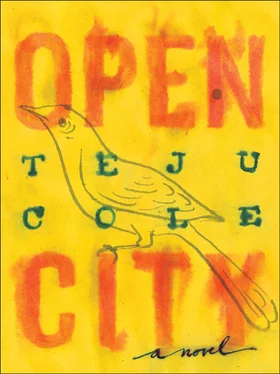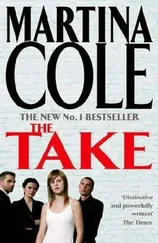He went into the kitchen, and returned with a bottle of Heineken for me. It’s the shade, you see, he said. It casts shade over other plants, cutting off their sunlight. A tree of heaven will grow anywhere, practically: abandoned lots, back gardens, sidewalks, streets, beaches, unused fields, even right inside boarded-up buildings, even in a sunless courtyard choked with academics. Well, what’s so bad about that? I said. A tree’s a tree, isn’t it? Can’t have too many trees in the city. It’s not so simple, he said. The tree of heaven reduces local biodiversity. It’s thought of as a pest, no good for timber or wildlife, and not even all that great for firewood.
While he spoke, I stood by the facing wall, which had a massive bookcase, and I looked at the endless rows of volumes, including a rich section on African and African-American literature. There was an overflow of books on the floor, and on the coffee table, I noticed a copy of Simone Weil’s essays. I picked it up. My friend turned from the window. She’s wonderful on the Iliad , he said. I think she really gets what force is about, how it motivates action and loses control of what it has motivated. You really should take a look at it sometime.
I had hoped for grace, I said, not for immortality. I had hoped for a graceful, strong exit for this professor of mine. I so badly wanted the old man to give me words of wisdom, I said, not this nonsense about lions. Maybe it’s still possible. Maybe the next time I see him, he’ll recite something from Gawain , or from some Middle English lyric. But maybe I’m being foolish. Instead of being thankful for the relationship, I’m attempting to design it to my own specifications. But, you know, I had hoped that, even as his body broke down, that intricate mind of his, one of the best I’ve ever known, would soldier on.
My friend looked at me, and said, I wonder why so many people view sickness as a moral test. It has nothing to do with morals or grace. It’s a physical test, and usually we lose. Then he clapped his hand on my shoulder, and said, My man, suffering is suffering. You’ve seen what it does, you see it every day. It might not be especially comforting to you now, but what you just said about the graceful and strong exit reminds me again of something I often think about. For many years, I’ve thought that the manner and timing of one’s death should be a matter of choice. And I really don’t think it should be limited to situations when terminal illness has made one’s suffering and death imminent. That it should be extended to seasons of life in which one is healthy. Why wait around for the decline? Why not preempt fate?
My friend had by now gone to stand by the window. I remained on the sofa and watched the low sun cut a black silhouette out of him, so that it almost seemed as if I were being addressed by his shadow, or by his future self. There were sparrows flitting about in the distance, attempting to find a place to rest for the night, darting in and out of the network of coves formed by the bare trees and the interlocking arches of the university’s buildings. As I reflected on the fact that in each of these creatures was a tiny red heart, an engine that without fail provided the means for its exhilarating midair maneuvers, I was reminded of how often people took comfort, whether consciously or not, in the idea that God himself attended to these homeless travelers with something like personal care; that, contrary to the evidence of natural history, he protected each one of them from hunger and hazard and the elements. For many, the birds in flight were proof that we, too, were under heaven’s protection, that there is indeed a special providence in the fall of a sparrow.
My friend waited for me to say something, but I didn’t, so he continued. The idea is contrary to the ethics, not to speak of the laws, of our time, but I cannot help but think that in thirty or forty years, when I’ve taken what joy life has to offer me, and come around to making the choice I have just described, it will have become, if not exactly popular or uncontroversial, at least much more common. Think about contraception, fertility drugs, and abortion; think about these decisions we make so easily about the beginning of life; think about our admiration of figures who chose their own ends: Socrates, Christ, Seneca, Cato. I suppose you don’t like how your professor said what he did about the lions, but you shouldn’t think of it as an insult to Africans. You know it wasn’t meant that way. What he seems to be saying is that, in a better world, the delirium and pain could be avoided. He could walk with his dignity intact into the forest, as he envisioned it, and never be seen again.
He had paused again, standing perfectly still and continuing to look outside. The birds were hardly visible now. Then, in a low voice, almost as if he were talking to himself or regarding his body from a posthumous point of view, he said, The reality, Julius, is that we are alone out here. Perhaps it’s what you professionals call suicide ideation, and I hope it doesn’t alarm you, but I often paint a detailed picture in my mind of what I would like the end of my life to look like. I think of saying goodbye to Clara and other people I love, then I picture an empty house, perhaps a large, rambling rural mansion somewhere near the marshes where I grew up; I imagine a bath upstairs, which I can fill with warm water; and I think of music playing all through this big house, Crescent , maybe, or Ascension , filling the spaces not taken up by my solitude, reaching me in the bath, so that when I slip across the one-way border, I do so to the accompaniment of modal harmonies heard from far away.
It had been several weeks since I had seen Professor Saito. At the end of March, I called him up, and a woman, not Mary but someone else, told me he had died. I gasped the words Oh, Christ into the phone and hung up. Afterward, sitting in my quiet room, I felt the blood moving around inside my head. The curtains were drawn open and I could see the tops of trees. The leaves were just beginning to come to life after an indifferent winter and, on all the trees on our street, the tips of branches were swollen, the tight, green buds looking as though they might open at any moment. I was shocked, saddened, but I was not completely surprised. Avoiding the drama of death, its unpleasantness, had been my inadvertent idea in not going there.
I called his place again — no longer his place, the thought occurred to me — and the same woman answered. I apologized for having hung up on her, explained who I was, and asked about funeral arrangements. She said, in too prim a tone of voice, that there would be a small private ceremony and that it would be for family only. There might be, she added, a memorial much later on, in the fall perhaps, organized at Maxwell College. I asked her if she knew how I could get in touch with Mary. She didn’t seem to be familiar with the name and, as she was eager to get off the phone, our conversation ended.
I didn’t know whom to call. He had meant so much to me but, I realized, our relationship had been so private or, rather, outside a network of other connected relationships, that hardly anyone else knew about it, or about how important it had been to us. I had a moment of peculiar doubt just then: perhaps I had overvalued the friendship, and the importance of it had been mine alone. I knew this was the shock speaking to me.
It was nine-thirty in the morning, and three hours earlier than that in San Francisco. I was surprised that Nadège answered the phone. I apologized again and again when I heard the sleepiness in her voice. It’s Professor Saito, I said, he died. You remember my old English literature professor, Professor Saito. He died of cancer, and I just found out. He was so kind to me. I’m sorry, is this a bad time to call? She said, No, it’s fine, how are you? And as she said this, I heard a man’s voice say, Who is that? And she, responding to him, said, Just give me a second. Later in the morning, she called me and said that it was best if she told me the truth, that it was simpler for everyone that way: she was engaged to be married. He was Haitian-American, someone with whom she’d been family friends for a long time. They would be married in late summer. It was best, she said, if I refrained from calling. Just for now; that would be best.
Читать дальше












